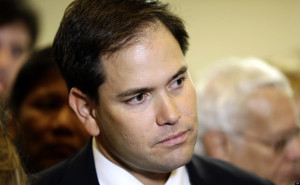Marco Rubio, speaking on CBS’ Face the Nation today, said he “believes that sexual preference is decided at birth, but still believes that states should be able to decide if they want to define marriage as anything other than involving a man and a woman.”
It’s questionable whether that view could survive a constitutional challenge, because marriage is not merely (and not always) a religious sacrament, but more importantly, consists of legal rights conferred by the state; and categorically denying those rights to a demographic group will likely be construed as violating constitutional equal protection guarantees.
Rubio is a major contender for the 2016 GOP presidential nomination. Early polling indicates he’s one of three viable candidates. The others are Jeb Bush and Scott Walker. This could change as the campaign progresses, of course, with candidates rising and fading. Early polls don’t mean all that much.
Rubio, a lawyer, knows better. He’s certainly aware of how equal protection works. His response was, “States have always regulated marriage. And if a state wants to have a different definition, you should petition the state legislature and have a political debate. I don’t think courts should be making that decision.” This isn’t a valid or viable legal argument. In fact, it flies in the face of long-established jurisprudence. Federal courts have been striking down state laws that conflict with the federal constitution since 1796. State legislation is subordinate to the supremacy clause, and a federal court won’t hesitate to throw out a state marriage regulation that violates federal constitutional rights.
So why is Rubio ignoring this? For political reasons, of course. He tries to get around the law by saying, “I don’t believe same-sex marriage is a Constitutional right.” But in the same breath he added, “I also don’t believe that your sexual preferences are a choice for the vast and enormous majority of people. In fact … I believe that sexual preference is something that people are born with.” These two positions are fundamentally incompatible. Being born with a certain sexual preference is like being born male or female or with a certain skin color. The only way same-sex marriage can not be a right entitled to equal protection is if homosexuality is a lifestyle choice and not an involuntary biological condition like gender or race.
Thus, Rubio isn’t making a legal argument, he’s making a political argument and, to some extent, stating a personal position; as a practicing Catholic he can hardly defy his church’s doctrine on homosexuality and same-sex marriage. For political expediency, he appears to be trying to have it both ways, by appeasing gays and those opposed to gay rights. That isn’t going to work. He has to side with one group or the other; he can’t cater to both.
Rubio has generated a lot of excitement as a young, bright, energetic, attractive, and forward-thinking politician — sort of a Republican JFK for the 21st century. But this interview, I think, shows that he’s still politically immature. In fact, I think it’s a potentially disastrous gaffe. He’s committing himself to a position the Supreme Court is likely to invalidate a few weeks from now. That will make him look inept. In the process, he will have needlessly alienated gay voters. Even worse, it implies that if he becomes president, he will let his religion drive policy, the prospect of which will drive away non-Catholic voters. This was one of the toughest campaign issues that Candidate Kennedy confronted, and JFK handled it infinitely better than Rubio just did. Why didn’t he simply copy Kennedy’s response?
If he wants to be America’s leader of the future, he can’t get there by weaseling out of hard issues. A real leader tackles such issues head-on. And if Rubio chooses the wrong side — catering to the ignorant bigoted mob making up the GOP’s homophobe wing instead of defending the Constitution and its timeless and precious principles — we shouldn’t choose him to lead us.  Our country already as a surfeit of slick politicians who excel at saying what sounds good to uncritical listeners, but won’t go out on a limb to do what’s right. We don’t need more of that kind of pseudo-leadership.
Our country already as a surfeit of slick politicians who excel at saying what sounds good to uncritical listeners, but won’t go out on a limb to do what’s right. We don’t need more of that kind of pseudo-leadership.
Photo: Is Rubio serious, or spouting cheap talk?